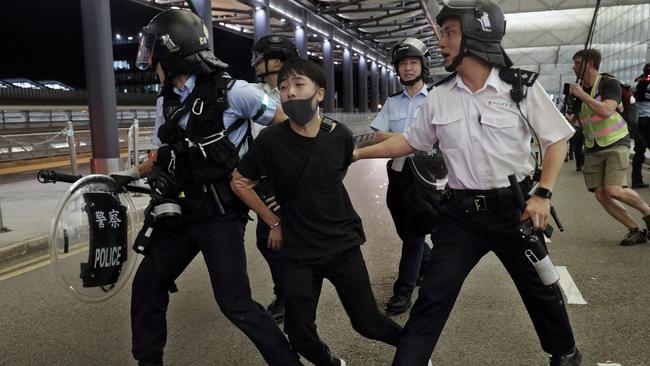
At the same time Singapore has become collateral damage in the trade war and is headed to recession. Meanwhile regional — and not just Chinese — money is now showing real interest in Australian residential property, particularly apartments. All these events are closely linked to our future, so we need to understand the forces.
Chinese officials in Beijing describe actions by the protesters, which they say include throwing petrol bombs, as “deranged acts”. Actions of the protesters mark the emergence of terrorism as “radical Hong Kong protesters repeatedly use extremely dangerous tools to attack police officers”, Beijing says. With these statements both the mainland Chinese and the region are being prepared for Chinese troops to move into Hong Kong
In Hong Kong itself, protesters and many other Hong Kong residents believe good government will not come until the current political order is turned on its head. And there is no future for Hong Kong society beyond 2047, when the “one country, two systems” settlement is due to expire. That’s just 28 years away.
Australians have a big stake in the events taking place to our north.
As Hong Kong airport was again closed, CNBC’s Jim Cramer said he expected the Chinese government to bring in the People’s Liberation Army to quell the crowds, a move that would have both global and regional implications.
Cramer has a huge following in both the US and the region. He hosts cable TV program Mad Money and is a former hedge fund manager, and a co-founder of The Street.
Cramer is putting into the marketplace something everyone fears: the shutdown of Hong Kong as a major financial hub in Asia and a trade war will lead to a global recession.
My friends in Beijing say that despite massing troops on the border, there remains great uncertainty among Chinese leaders, because taking control of the narrow streets of Hong Kong is a much harder military exercise than Tiananmen Square.
But if President Xi Jinping pushes the “go” button, it will be brutal and many young Hong protesters will end in Chinese prisons and perhaps not seen again. The role of Hong Kong as a financial hub will be changed for ever and Australia will see an influx of capital and people.
“Saving face” is very important in Chinese society and this is becoming an issue for Beijing’s leadership, not just in Hong Kong but in the trade talks. If Xi backs down in the face of trade war pressure from Donald Trump he will lose face; something Trump almost certainly knows.
The US President has no such issue and so this week was able to back down by announcing a delay in new tariffs on several categories of Chinese-made consumer goods until December 15. The goods involved include mobile phones, laptops, games consoles, some toys, computer monitors, and certain items of footwear and clothing.
It was Trump’s second major backdown. He allowed US companies to export selected chips and certain vital components to China because he knew that if he did not ease the pressure China might invade Taiwan to secure supplies. I detailed these strategies last month.
After the second backdown, the Dow immediately surged about 373 points, or 1.4 per cent, recovering most of Monday’s nearly 400-point drop. If we have a global recession as a result of the trade war, Trump’s, chances of re-election are lessened, so he will be looking for at least a partial settlement. And the link between the trade war and US share prices was rammed home by the Wall Street reaction.
But remember this is also a war about databases and artificial intelligence, so there are no certainties.
Back to Hong Kong and we should not forget that 20 years ago China needed Hong Kong. Now Shanghai is its financial capital, so what happens to Hong Kong is not as vital to China. But what is important is that if the violent protests continue and keep disrupting air traffic, then if China does not act it will be seen as a sign of weakness and may spark similar protests on the mainland.
This becomes particularly dangerous given that the Chinese economy is slowing as the trade war bites.
I see that Scott Morrison is talking about reducing migration to Australia. He needs to be watch what is happening in Hong Kong.




As Chinese troops advance towards Hong Kong and mainland Chinese media outlets warn protesters they are “asking for self-destruction,” President Trump suddenly takes a step back in the trade war and Wall Street surges.